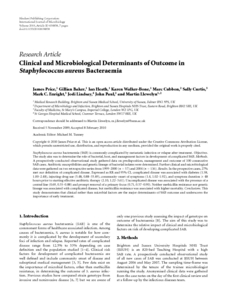Price, J; Baker, G; Heath, I; Walker-Bone, K; Cubbon, M; Curtis, S; Enright, MC; Lindsay, J; Paul, J; Llewelyn, M
(2010)
Clinical and Microbiological Determinants of Outcome in Staphylococcus aureus Bacteraemia.
International Journal of Microbiology, 2010 (654858).
ISSN 1687-9198
https://doi.org/10.1155/2010/654858
SGUL Authors: Lindsay, Jodi Anne
![[img]](https://openaccess.sgul.ac.uk/1809/1.hassmallThumbnailVersion/IJMB2010-654858.pdf)  Preview |
|
["document_typename_application/pdf; charset=binary" not defined]
Published Version
Download (505kB)
| Preview
|
Abstract
Staphylococcus aureus bacteraemia (SAB) is commonly complicated by metastatic infection or relapse after treatment. Objectives. The study aim was to determine the role of bacterial, host, and management factors in development of complicated SAB. Methods. A prospectively-conducted observational study gathered data on predisposition, management and outcome of 100 consecutive SAB cases. Antibiotic susceptibilities and genetic lineage of bacterial isolates were determined. Further clinical and microbiological data were gathered on two retrospective series from 1999-2000 (n = 57) and 2004 (n = 116). Results. In the prospective cases, 27% met our definition of complicated disease. Expressed as RR and 95% CI, complicated disease was associated with diabetes (1.58, 1.00-2.48), injecting-drug use (5.48, 0.88-33.49), community-onset of symptoms (1.4, 1.02-1.92), and symptom duration >/=48 hours prior to starting effective antibiotic therapy (2.10, 1.22-3.61). Uncomplicated disease was associated with the presence of a central line (0.69, 0.55-0.88) and prompt removal of a primary focus (0.71, 0.57-0.90). Neither methicillin resistance nor genetic lineage was associated with complicated disease, but methicillin resistance was associated with higher mortality. Conclusions. This study demonstrates that clinical rather than microbial factors are the major determinants of SAB outcome and underscores the importance of early treatment.
Statistics
Item downloaded times since 01 May 2012.
Actions (login required)
 |
Edit Item |




